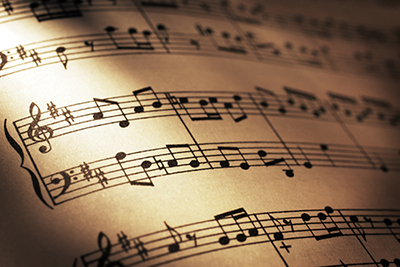Music Curriculum & Transfer
Lakeland Community College offers an array of music courses intended for the general education student, beginning and experienced performers, and coursework that will allow the student to complete the first two years of a Bachelor of Music with transfer options to a number of institutions. Students interested in a degree related to music should complete Lakeland's Associate of Arts degree.
Three music courses are in the Ohio Transfer 36, require no prior musical background, and fulfill in part the arts and humanities requirements of many Lakeland degrees:
- MUSC 1200 Music Appreciation
- MUSC 1215 World Music
- MUSC 1800 Popular Music: Rock, Jazz, Country, and Hip-Hop
Two additional courses require the ability to read musical notation fulfill in part the arts and humanities requirements of many Lakeland degree and are Transfer Assurance Guides courses:
- MUSC 2200 Music History and Literature I
- MUSC 2250 Music History and Literature II
The Civic Music program of Lakeland Community College offers five music ensembles for credit, several of which are a part of the Ohio Transfer Assurance Guarantee program:
- MUSC 2730 Lakeland Civic Flute Choir
- MUSC 2750 Lakeland Civic Chorus
- MUSC 2850 Lakeland Civic Orchestra
- MUSC 2890 Lakeland Civic Band
- MUSC 2895 Lakeland Civic Jazz Orchestra
In addition, student ensembles may register for MUSC 2700: Small Group Music in order to receive faculty coaching and college credit for chamber groups, popular music ensembles or other independent performance projects. Sixty percent of the performers in the ensemble must register for the course.
Membership in Civic Music ensembles is open to all Lakeland students and community members by audition. Music ensembles rehearse one evening a week and present three to five concerts during the year. It is recommended that students have at least two years of experience performing at the high school level prior to auditioning. Contact the Civic Music ensemble director for details.

We would love to have you in our audience for any music or theater performance. The current Arts schedule gives the full listing of all Arts at Lakeland events and you can purchase tickets for performances online. For detailed information about prior performances, see our concert, gallery and theater event programs.
Lakeland's music department offers beginning through advanced course work for students wishing to pursue study of an instrument or voice in either individual or group settings. We offer beginning studies in a class setting for voice, piano, and guitar through the following courses:
- MUSC 1000 Group Voice
- MUSC 1030 Group Guitar I
- MUSC 1050 Group Piano I
For other instruments, Lakeland is pleased to partner with the Fine Arts Association to offer private applied instruction for college credit for voice, piano, flute, oboe, clarinet, bassoon, saxophone, horn, trumpet, trombone, euphonium, tuba, percussion, violin, viola, cello, bass (electric and acoustic), guitar, harp and organ. All instruments are available for a half-hour lesson per week (one credit) or a weekly hour lesson (two credits). Students registering for private lessons are responsible for contacting their instructor to arrange schedule and payment of course fees in addition for paying tuition to Lakeland. For most lessons, this is done through the Fine Arts Association, but students should start by registering for Lakeland courses MUSC 1251-1271 (for the appropriate instrument or voice and number of credits).
Lakeland students can fulfill all of the requirements for the first two years of a bachelor's degree in music, music education or music therapy. This makes our program ideal for students who started on music later in life, or who make the decision to focus on music later than is expected for many four-year programs.
Students intending to earn a bachelor's degree in a music-related field should take the following courses (all of which are a part of the Ohio Transfer Assurance Guarantee program):
- MUSC 1050 Group Piano I
- MUSC 1600 Music Theory I
- MUSC 1700 Music Theory II
- MUSC 2200 Music History and Literature I
- MUSC 2250 Music History and Literature II
- MUSC 2400 Music Theory III
- MUSC 2500 Music Theory IV

The music department supports Lakeland's media technology program by offering two courses in electronic music, which are required for students in the audio recording track of the Associate of Applied Science in media technology and are also open to interested elective students:
- MUSC 2650 Electronic Music I
- MUSC 2660 Electronic Music II
Students interested in pursuing a four-year degree in music will find that Lakeland's courses meet most requirements. In addition to many seamless transfer partners through the Ohio Transfer 36, the following options are currently available to Lakeland students:
- Case Western Reserve University: Cleveland Humanities Collaborative
- Cleveland State University Liberal Arts and Social Sciences Pathway
Students intending to transfer and major in music should:
- Work with the Lakeland Transfer Center as soon as possible to determine admission and audition requirements at four-year institutions.
- Take private lessons on their major instrument for credit every spring and fall semester at Lakeland (two credits per semester recommended).
- Participate in a Lakeland Civic Music ensemble for credit every spring and fall semester at Lakeland.
- Complete all four music theory courses (MUSC 1600, 1700, 2400, and 2500)
- Complete all music history and literature courses (MUSC 2200 and 2250)
- Complete the Ohio Transfer 36 requirements*.
- Take at least one semester of group piano or an applied piano class.
- Prepare an audition into the receiving four-year program, typically in the winter of the year prior to transfer.
*Note that the general education courses in music (MUSC 1200, 1215, and 1800) are not typically required for a bachelor's degree in music. Music majors will want to complete a course in at least one other arts or humanities area as listed in the requirements for the Associate of Arts.



